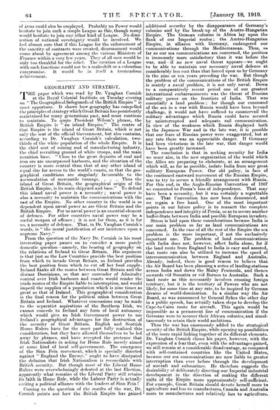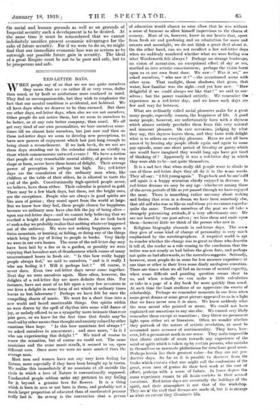GEOGRAPHY AND STRATEGY.
THE paper which was read by Dr. Vaughan Cornish I_ at the Royal Colonial Institute on Tuesday evening on " The Geographical Safeguards of the British Empire " is most opportune. It shows how geography has compelled the principles of strategy which Great Britain has persistently maintained for many generations past, and must continue to maintain. To quote President Wilson's phrase, the British Empire is "an island Empire." The centre of that Empire is the island of Great Britain, which is not only the seat of the official Government, but also contains, according to Dr. Vaughan Cornish's calculation, two- thirds of the white population of the whole Empire. It is the chief seat of mining and of manufacturing industry, the chief recruiting ground of white troops, and the main munition base. Close to the great deposits of coal and iron ore are unsurpassed harbours, and the situation of the country is more central than that of any other island of equal size for access to the world's coasts, so that the geo- graphical conditions are singularly favourable to the accumulation of mercantile tonnage. . . . Thus the island of Great Britain, the geographical origin of the British Empire, is its main shipyard and base." To defend this island naval power is a necessity ; naval power is also a necessity to maintain the communications with the rest of the Empire. No other country in the world is so dependent upon naval power as are Great Britain and the British Empire. For us naval power is an essential element of defence. For other countries naval power may be a useful weapon of offence ; it is not for them, as it is for us, a necessity of defence. That, in Dr. Vaughan Cornish's words, is "the moral justification of our insistence upon a supreme Navy." From the question of the Navy Dr. Cornish in his moat interesting paper passes on to consider a more purely domestic question—namely, the bearing of geography on the relations of Ireland to Great Britain. His argument is that just as the Low Countries provide the beat position from which to invade Great Britain, so Ireland provides the best position from which to cut off her food supply. Ireland flanks all the routes between Great Britain and the distant Dominions, so that any surrender of Admiralty control over Irish harbours and coasts would render the trade routes of the Empire liable to interruption, and would imperil the supplies of a population which is nine times as great as that of Ireland. This geographical consideration is the final reason for the political union between Great Britain and Ireland. Whatever concessions may be made to the separatist aspirations of the Southern Irish, we cannot concede to Ireland any form of local autonomy which would give an Irish Government power to use Ireland's geographical advantages for the destruction of the security of Great Britain. English and Scottish Home Rulers have for the most part fully realized this consideration, but they have allowed themselves to be led away by phrases, and have accepted the pretence that Irish Nationalists in asking for Home Rule merely aimed at some kind of local self-government. The emergence of the Sinn Fein movement, which is specially directed against " England the Enemy," ought to have dissipated the delusion that Irish Nationalism is reconcilable with British security. But though most of the Liberal Home Rulers were overwhelmingly defeated at the last Election, apparently what remains of the Liberal Party still retains its faith in Home Rule, while the Labour Party is actually seeking a political alliance with the leaders of Sinn Fein Coming to the question of the results of the war, Dr. Cornish points out how the British Empire has gained additional security by the disappearance of Germany's colonies and by the 'break-up of the Austro-Hungarian Empire. The German colonies in Africa lay upon the flank of our Imperial routes ; the Austro-Hungarian Empire, in alliance with Germany, endangered our communications through the Mediterranean. Thus, so far as our sea communications are concerned, the position is immensely more satisfactory than it was before the war, and—if no new naval threat appears—we ought to be able to maintain our necessary naval defence at considerably less coat than that forced upon us by Germany in the nine or ten years preceding the war. But though the problem of the communications of the British Empire is mainly a naval problem, it is not only naval. Down to a comparatively recent period one of our greatest international embarrassments was the threat of Russian military power on the frontiers of India. That was essentially a land problem ; for though our command of the sea in a war with Russia would have been beyond challenge, it would not have sufficed to countervail the military advantages which Russia could have secured by uninterrupted and adequate rail communication. In view of the weakness which Russia displayed both in the Japanese War and in the late war, it is possible that our fears of Russian power were exaggerated, but at any rate there was an appreciable danger. If Germany had been victorious in the late war, that danger would have been greatly increased.
The conclusion is that in seeking security for India we must aim, in the new organization of the world which the Allies are preparing to elaborate, at an arrangement which will, as far as possible, isolate India from any great military European Power. Our old policy, in face of the continued eastward movement of the Russian Empire, was to try to secure a friendly arrangement with Russia. For this end, in the Anglo-Russian Convention of 1907 we consented to Persia's loss of independence. That may have been a necessity, but it was certainly a regrettable one. That Convention has now been denounced, and we regain a free hand. One of the most important points in our future policy is to reassert the complete independence and integrity of Persia, so as to secure another buffer-State between India and possible European invaders.
Stress is laid upon these considerations because India is our main problem so far as land communications are concerned. In the case of all the rest of the Empire the sea problem is the more important, if not the exclusively important one. The problem of land communications with India does not, however, affect India alone, for if the land route from England to India is easy and assured, that route can also be utilized to increase the speed of intercommunication between England and Australia. Already, indeed, there is good. reason to believe that the Air Board has been planning a series of landing-stations across India and down the Malay Peninsula, and thence onwards vid Sumatra or vid Borneo to Australia. Such a land route as this necessarily involves crossing foreign territory, but it is the territory of Powers who are not likely, for some time at any rate, to be inspired by German dreams of world-domination. In a similar way the Air Board, as was announced by General Sykes the other day in a public speech, has actually taken steps to develop the Cape-to-Cairo route for aircraft. This again would be impossible as a permanent line of communication if the Germans were to recover their African colonies, and simul- taneously to retain their world ambitions. - Thus the war has enormously added to the strategical security of the British Empire, while opening up possibilities of the more rapid linking together of its different elements. Dr. Vaughan Cornish closes his paper, however, with the expression of a fear that, even with the advantages gained, we still remain at a considerable disadvantage, as compared with self-contained countries like the United States, because our sea communications are now liable to greater interruption than ever before through the development of aircraft and submarines. He therefore suggests the desirability of deliberately directing our Imperial industrial development in the direction of making the different units of the Empire more approximately self-sufficient. For example, Great Britain should devote herself more to agriculture endless to manufactures, Canada and Australia more to manufactures and relatifely lass to agriculture.
On social and human grounds as well as on grounds of Imperial security such a development is to be desired. At the same time it must be remembered that we cannot indefinitely sacrifice present economic advantages for the sake of future security. For if we were to do so, we might find that our immediate economic loss was so serious as to outweigh our possible future gain in security. The ideal of a great Empire must be not to be poor and safe, but to be prosperous and safe.



































 Previous page
Previous page